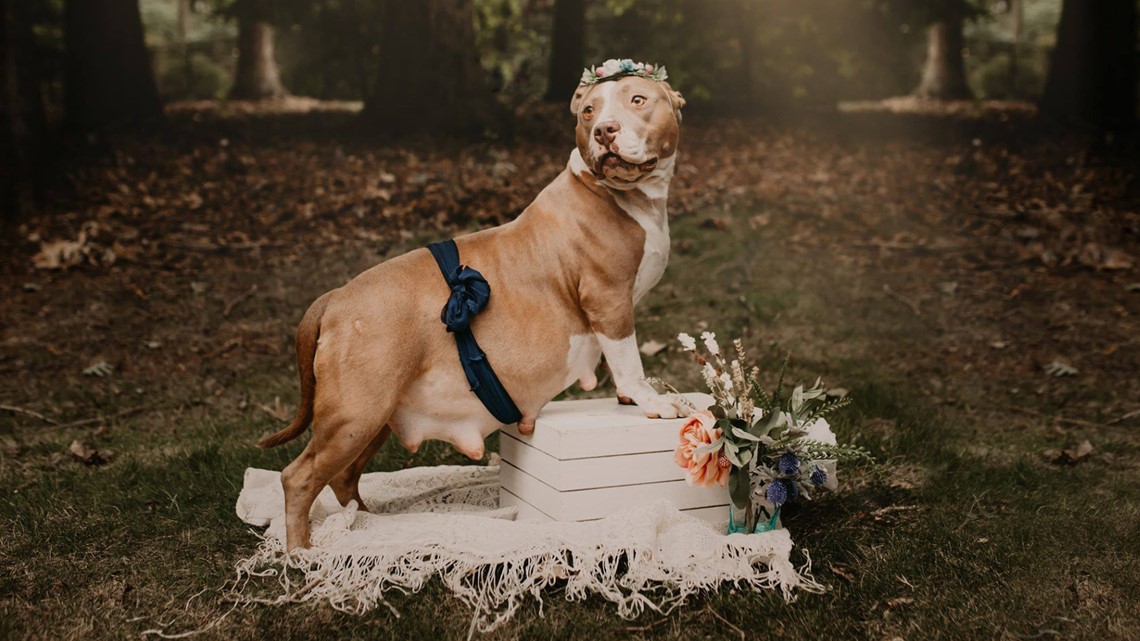Pitbulls may be known for their strong and muscular build, but did you know that their ability to reproduce is just as fascinating? Despite popular misconceptions, pitbulls, like any other breed of dog, are indeed capable of getting pregnant.
While pitbulls are capable of reproduction, it is essential to understand the importance of responsible breeding. Overpopulation of dogs is a prevalent issue, with millions of unwanted dogs being euthanized each year. Spaying or neutering your pitbull not only helps control the population, but it also has health benefits for your pet, such as reducing the risk of certain cancers. By taking proactive measures and ensuring responsible breeding practices, we can ensure the well-being of both pitbulls and our canine companions as a whole.
Discover the reproductive capabilities of Pitbulls!
Are you wondering if Pitbulls can get pregnant? Pitbulls, like all dogs, are capable of reproduction. They can become pregnant and give birth to puppies. If you are a Pitbull owner or considering breeding Pitbulls, it’s essential to understand their reproductive cycle and the responsibilities that come with it. Proper care and supervision are key to ensuring the health and well-being of both the mother and her puppies.

Can Pitbulls Get Pregnant? Exploring the Reproductive Capacity of Pitbulls
Pitbulls are a popular breed known for their strength, loyalty, and affectionate nature. However, when it comes to their reproductive capacity, many people have questions. Can pitbulls get pregnant? In this article, we will explore the topic in detail and provide you with all the information you need to know about pitbulls and their ability to reproduce.
The Reproductive System of Female Pitbulls
Female pitbulls, like other dogs, have a reproductive system designed for reproduction. They have two ovaries and a uterus, just like humans. Pitbulls reach sexual maturity at around six to twelve months of age, although it is best to wait until they are at least two years old before considering breeding. When a female pitbull is in heat, which typically occurs every six to eight months, she is receptive to mating and can become pregnant.
During the heat cycle, the female pitbull’s body goes through several stages. The first is proestrus, which is characterized by swelling of the vulva and the release of bloody discharge. This stage lasts for about nine days on average. It is followed by estrus, which is the fertile period. The female pitbull may show signs of being more affectionate, urine marking, and attracting male dogs. This stage can last for about nine days as well. It is during estrus that the female pitbull can become pregnant if she mates with a male dog. If no mating occurs, the cycle enters its final stage, called diestrus.
Benefits of Spaying Female Pitbulls
While many people may consider breeding their pitbulls, it is essential to remember the benefits of spaying female pitbulls. Spaying, which is the surgical removal of the ovaries and uterus, not only prevents unwanted pregnancies but also offers various health benefits. Spaying eliminates the risk of uterine infections, prevents certain types of cancers, and reduces the risk of breast tumors, especially if done before the first heat cycle. It also reduces unwanted behaviors associated with heat cycles, such as agitation, roaming, and attracting male dogs. Spaying your female pitbull can help ensure her long-term health and well-being.
The Role of Male Pitbulls in Reproduction
Male pitbulls, like other male dogs, play a crucial role in reproduction. They have a pair of testicles that produce sperm and are capable of impregnating a female pitbull during mating. Male pitbulls reach sexual maturity at around six to twelve months of age, similar to females. They are generally fertile throughout their lifetime, although the quality of the sperm may decline with age.
To ensure a successful mating, it is crucial to consider factors such as the timing of the female’s heat cycle and the temperament and health of both dogs. It is always recommended to consult with a professional breeder or veterinarian to ensure the best outcome and to avoid any potential complications.
The Importance of Responsible Breeding
If you are considering breeding your pitbulls, it is essential to prioritize responsible breeding practices. This includes ensuring the health and well-being of both the male and female pitbulls involved, selecting suitable mates that complement each other in terms of temperament and physical traits, and providing proper care before, during, and after mating. Responsible breeding also means being prepared to care for and find suitable homes for the puppies that are born. It is essential to familiarize yourself with local laws and regulations regarding dog breeding, as well as any breed-specific considerations or restrictions.
Caring for a Pregnant Pitbull
If your female pitbull becomes pregnant, it is crucial to provide proper care to ensure the health of both the mother and the puppies. This includes providing a balanced and nutritious diet, regular exercise, and regular veterinary check-ups. It is also essential to create a safe and comfortable whelping area for the mother to give birth. The gestation period for pitbulls is approximately 63 days, and during this time, the pregnant pitbull should receive extra care and attention.
Tips for Responsible Pet Ownership
Whether you have a male or female pitbull or are considering breeding them, responsible pet ownership is essential. This includes providing them with a nutritious diet, regular exercise, veterinary care, and a loving and safe environment. It is important to spay or neuter your pitbulls if they will not be used for breeding to prevent unwanted litters and potential health issues. Additionally, consider socializing and training your pitbull from an early age to ensure they become well-behaved and balanced members of your family. Remember, owning a pitbull comes with great responsibility, but the love and loyalty they offer in return are truly priceless.
Pitbulls as Family Pets: The Importance of Responsible Ownership
While the ability of pitbulls to get pregnant is an important consideration, it is equally important to focus on responsible ownership. Pitbulls make wonderful family pets when provided with the care, love, and training they need. Let’s delve into the essential aspects of responsible ownership when it comes to pitbulls.
Socialization and Training
Pitbulls, like all dogs, require socialization and training to become well-behaved and balanced pets. Starting from a young age, it is crucial to expose them to various environments, people, and animals. This helps them develop positive associations and prevents them from becoming fearful or aggressive. Training should focus on positive reinforcement techniques to encourage good behavior and discourage unwanted behaviors. Consistency, patience, and rewards are key to successful training.
The Benefits of Socializing Pitbulls
Socializing your pitbull has numerous benefits. It helps them become comfortable and confident in different situations, reduces fear and anxiety, and promotes friendly behavior towards other animals and people. Well-socialized pitbulls are more likely to be tolerant, adaptable, and less prone to aggression. Regular exposure to new experiences, such as walks in different locations or visits to dog parks, can greatly contribute to their socialization.
Providing a Safe and Stimulating Environment
Pitbulls are energetic and intelligent dogs that require both physical and mental stimulation to thrive. Providing them with a safe and stimulating environment is essential for their well-being. This includes daily exercise, such as walks, playtime, and interactive toys that challenge their minds. A fenced-in yard or dedicated play area can give them the opportunity to burn off energy in a secure space. Keeping them mentally engaged by teaching them tricks or participating in obedience training can also be highly beneficial.
Tips for Exercising Pitbulls
When it comes to exercise, pitbulls have a lot of energy to burn. Aim for at least an hour of exercise every day, which can include brisk walks, jogging, playing fetch, or participating in dog sports such as agility or obedience training. Always consider your pitbull’s age, health, and individual needs when determining the appropriate level of exercise. Mental stimulation is just as important as physical exercise, so provide puzzle toys, interactive games, or training sessions to keep their minds engaged and prevent boredom.
Nutrition and Healthcare
A balanced and nutritious diet is essential for the overall health and well-being of pitbulls. Consult with a veterinarian to determine the appropriate type and amount of food for your pitbull based on factors such as age, weight, and activity level. Regular veterinary check-ups, vaccinations, and preventive care, such as flea and tick control, are also crucial to ensure their health. Additionally, grooming should be part of their regular routine, including brushing their coats, cleaning their ears, and trimming their nails.
Benefits of Regular Veterinary Check-ups
Regular veterinary check-ups play a vital role in preventing and detecting health issues early on. The veterinarian can assess your pitbull’s overall health, administer necessary vaccinations, perform routine tests, and provide appropriate preventive care. Early detection of any potential health concerns allows for prompt intervention and treatment, ensuring a long and healthy life for your pitbull.
The Importance of Breed-Specific Legislation Awareness
It is important to be aware of any breed-specific legislation (BSL) that may exist in your area. BSL refers to laws or regulations that target specific breeds, including pitbulls. These laws may impose restrictions or additional requirements on pitbull owners, such as mandatory muzzling or specific training requirements. Knowing and adhering to any BSL in your jurisdiction is essential to ensure legal compliance and to promote responsible ownership.
The Role of Advocacy in Responsible Ownership
Responsible pitbull ownership also involves advocating for the breed and combating negative stereotypes. Pitbulls often face unfair scrutiny and discrimination due to misconceptions about their temperament or behavior. As responsible owners, it is essential to educate others, promote positive representations of pitbulls, and support initiatives that aim to challenge breed-specific stigmas.
Common Myths About Pitbull Reproduction: Debunked
When it comes to pitbull reproduction, there are several myths and misconceptions that circulate. Let’s take a closer look at some of the most common myths and debunk them with accurate information.
Myth 1: Pitbulls Have a High Reproductive Capacity
Contrary to popular belief, pitbulls do not have a higher reproductive capacity compared to other dog breeds. Their reproductive system functions similarly to that of other dogs, and they reach sexual maturity at a similar age. The ability to conceive and carry puppies is not unique to pitbulls but is a natural characteristic of all female dogs.
Myth 2: All Pitbulls Can Successfully Reproduce
While most female pitbulls are capable of reproducing, not all of them should be bred. Breeding should only be carried out with careful consideration of the health, temperament, and genetic background of both the male and female pitbulls. Responsible breeding practices help ensure the well-being of both the parents and the resulting puppies.
Myth 3: Pitbull Puppies Are Easy to Sell
The belief that pitbull puppies are easy to sell is not entirely accurate. Selling puppies requires time, effort, and the establishment of a reputable network. Additionally, responsible breeders prioritize finding suitable homes for the puppies, taking into account factors such as the potential owner’s ability to care for the puppy and provide a loving environment. Selling puppies should always be done responsibly, considering the best interests of the puppies and the breed as a whole.
Myth 4: Breeding Pitbulls Will Solve Behavioral Issues
Breeding pitbulls is not a solution for behavioral issues. In fact, breeding dogs with behavioral problems can potentially perpetuate those issues in the offspring. It is essential to address and manage any behavioral challenges in pitbulls through proper training, behavior modification techniques, and seeking assistance from professionals if needed.
Myth 5: Spaying or Neutering Will Negatively Impact a Pitbull’s Health
The belief that spaying or neutering a pitbull will negatively impact their health is unfounded. In fact, spaying or neutering offers numerous health benefits, such as reducing the risk of certain types of cancers, preventing unwanted litters, and curbing unwanted behaviors associated with heat cycles or mating instincts. It is always recommended to consult with a veterinarian to make an informed decision about spaying or neutering your pitbull.
In conclusion, pitbulls can indeed get pregnant, but responsible ownership and breeding practices are essential. Understanding the reproductive system of pitbulls, ensuring proper care throughout the mating and pregnancy process, and prioritizing responsible pet ownership are crucial. By debunking common myths and misconceptions, we can provide accurate information and promote a positive image of pitbulls as loving and loyal family pets.
Key Takeaways on “Can Pitbull Get Pregnant?”
- Yes, pitbulls can get pregnant.
- Female pitbulls go into heat, indicating they are ready to mate.
- Pitbulls can have litters of puppies.
- Mating should be carefully planned and supervised by a professional.
- Owners should consider spaying or neutering their pitbulls to prevent unplanned pregnancies.
Frequently Asked Questions
Are you wondering if a pitbull can get pregnant? Look no further! We’ve answered some common questions about pitbull pregnancy below.
How does a pitbull get pregnant?
A female pitbull can get pregnant through sexual reproduction. When she is in heat, she releases eggs, and if she mates with a male dog during this time, fertilization can occur. The male dog’s sperm travels through the female’s reproductive tract and fertilizes the eggs, leading to pregnancy.
Pitbulls, like other dogs, go through a heat cycle, also known as the estrous cycle, where they are fertile and can conceive. This cycle typically occurs every 6 to 12 months, and a female pitbull will usually show signs of being in heat, such as swollen vulva and increased urination frequency. It’s important to note that spaying or neutering your pet is a responsible decision to prevent unintended pregnancies.
How long does a pitbull pregnancy last?
The gestation period for a pitbull, similar to most dog breeds, is approximately 63 days. This period starts from the time of conception or when the eggs are fertilized until the puppies are ready to be born. During this time, the pregnant pitbull will experience physical and hormonal changes that prepare her body for giving birth.
It’s crucial to provide proper care for a pregnant pitbull during this period. This includes providing a nutritious diet, regular vet check-ups, and creating a comfortable and safe environment for the expectant mother.
How many puppies do pitbulls usually have?
The number of puppies a pitbull can have in a litter can vary but typically ranges from 5 to 10 puppies. However, larger litters of up to 12 or more puppies are not uncommon. The size of the litter can depend on various factors, such as the individual dog, the health of the mother, and genetic factors.
If you’re considering breeding pitbulls, it’s essential to ensure you have the knowledge, resources, and responsibility to properly care for and find suitable homes for all the puppies that may be born.
What should I do if my pitbull is pregnant?
If you suspect that your pitbull is pregnant, the first step is to consult with a veterinarian. They can confirm the pregnancy through various methods such as ultrasound or palpation. The vet will provide guidance on the proper care, nutrition, and exercise regimen for the pregnant pitbull.
It’s important to note that breeding should be done responsibly, with proper consideration for the health and well-being of the dogs involved. If you have no intention of breeding, consider spaying your female pitbull to prevent unwanted pregnancies and contribute to the control of the dog population.
Can a pitbull get pregnant from a different breed?
Yes, a pitbull can get pregnant from a different breed. Dogs of different breeds can mate and produce mixed breed puppies. The genetic traits of the puppies can vary depending on the traits inherited from both the pitbull and the other breed.
It’s worth noting that breeding dogs of different breeds should be approached responsibly to ensure the health and welfare of the parents and the resulting puppies. Consulting with a veterinarian or a reputable dog breeder is recommended to understand the potential outcomes and any specific considerations for such matings.

How To Tell If Pitbull is Pregnant
Summary
Pitbulls can get pregnant just like any other dog breed. Female pitbulls go into heat twice a year, and mating can result in a pregnancy. It is important to ensure a safe and controlled breeding process to prevent unwanted pregnancies and health issues. If you have a female pitbull, consult with a veterinarian for guidance on responsible breeding practices.
It is crucial for pitbull owners to educate themselves about proper reproductive care and options such as spaying or neutering. This can help prevent overpopulation and reduce the risks associated with reproduction. Remember, being a responsible pet owner means making informed decisions to keep our furry friends healthy and happy.
